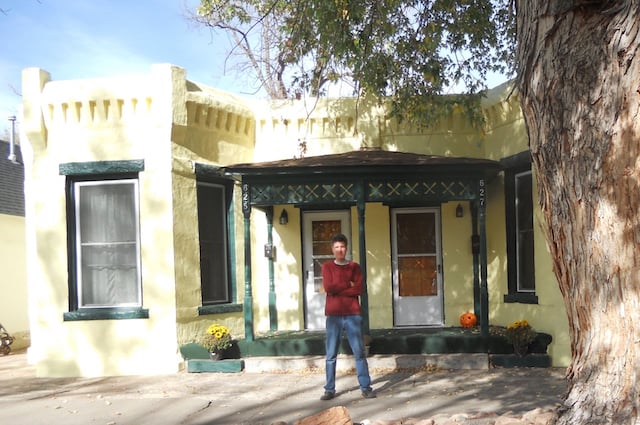Here’s How to Buy a House Without a Mortgage — In Your 30s

My wife and I paid cash for our last three homes.
And yes, it is nice not having a monthly payment. There also are many other reasons to buy a house for cash. You can get a better price and save thousands in closing costs.
But is buying a house in cash even possible for the average person?
In fact, almost a third of home sales in the U.S. are made in cash, and in southwest Florida, more than half of the area’s transactions are cash sales.
Of course, the latter statistic is partly the result of so many retirees buying homes in cash after a lifetime of saving and building equity in previous residences.
But even if you’re nowhere near retirement and haven’t saved enough for a down payment — let alone the whole house — there is hope.

My wife and I first paid cash for a home in our 30s. We were making a combined $12,000 per year at the time — and I’ve never worked full time for more than a few months.
Here’s how we did it, and how you, too, can (eventually) buy a house with cash.
Live With Your Parents
I moved back to my parents’ house at age 20 and stayed there until I was 25 years old, paying minimal rent.
Of course, it’s not an option for everyone, but if you can swing it, living with your parents is a great way to save money. In fact, 14% of adults ages 24 to 34 live with their parents.
By 25, I’d saved enough for a down payment on a home, working part time at various low-paying jobs.
If you’re going to live with mom and dad for a few years, saving up for a down payment (or a whole house) should be your goal.
Of course, you have to actually set the money aside, which brings us to your next step…
Start Saving Now
Whatever income you’re living on, someone you know is probably living on less. Live like they do, and bank the difference.
We can help! Check out these posts on how to spend less money on everything from groceries to gas to clothing, even 101 things you can get for free. Bonus: Here are 44 ways to save money fast.
To help you set aside the savings, read how to save money when you’re living paycheck-to-paycheck and how to make up to 5% back from your checking and savings accounts.
The goal is to consistently spend less than you make — and put the difference toward buying a house in cash later.
Here are some more ways to save for a house:
- Set aside windfalls like inheritances, work bonuses and contest winnings
- Set aside most or all of any tax refunds
- Devote pay raises to savings
- Sell things you don’t need to boost savings
- Find ways to cut costs and bank the savings
- Put savings in the highest-return, non-volatile place you can find
The last item deserves an explanation.
The stock market may provide better long-term returns than other options. But it also might be down 50% when you’re ready to buy that house.
Instead, invest where you won’t have ups and downs. CD laddering is one strategy you can use. Arrange for the last of the CDs to mature around the time you think you’ll be ready to buy your house.
To get a higher return, invest on a social lending platform like Lending Club. You might make up to 10% on your money, and statistics show less than 1% of investors who buy more than 100 notes ($2,500 at $25 per note) lose money.
Just be sure the loans will mature before you’re ready to buy, since you can invest in both three-year and five-year loans.

Find Cheaper Housing
Prior to buying a house in cash, you might rent, or borrow to buy something.
Either way, keep costs low so you save even more money.
For example, I bought a mobile home on a lot for $19,500, with a down payment of $5,000.
Even with an interest rate of 14%, the monthly payments were just $225 for a 10-year loan. With such a low payment, it was easy to put a lot of extra income toward paying off the loan.
I was mortgage-free in a couple years, and had an extra $225 to set aside every month.
This is a touchy area for many people. You may not want to live in a mobile home (mine was very comfortable), or rent an efficiency apartment for years just to save money.
I feel richer living without debt in a small place, rather than living in a big house or beautiful (and expensive) apartment. If you try it, you might feel the same way.
Or maybe not. It’s your call.
Fortunately, there are options between extremes, so you can live comfortably while still saving money each month.
For example, if you’re renting an apartment for $950 per month, look for something decent that costs just $700 per month.
Sure, it won’t be quite as nice, but you’ll have save an extra $3,000 per year. Also, look for other ways to save on rent.
I did one more thing to pay off my mortgage quickly: I rented out rooms.
This option won’t be for everyone, but for me it was a choice between living with roommates and working full-time jobs, which I try to avoid.
Buy Where Homes are Cheaper
After we married, my wife and I bought a house together for $17,500 in Anaconda, a beautiful little Montana mountain town.
We literally drove around the country for weeks until we found a place where houses were selling cheap.
By then, we were able to pay cash without selling our Michigan mobile home. We rented it out, and later sold it for $45,000 — not bad considering I only paid $19,500.
The U.S. has a number of towns with affordable housing, and even places where houses are almost free.
If moving to affordable cities isn’t possible because of your work, look for the most affordable neighborhoods near your job.
And you can also…
Buy Less Expensive Types of Housing
As pointed out, a mobile home can be a good first purchase, at least if you buy it on property, rather than on a rented lot.
But also consider other types of housing.
College student Joel Weber built a tiny house for around $16,000. You could also look into school busses and other housing alternatives.
Live cheaply, and you can save money quickly.
You don’t have to go to extremes that don’t suit you. Just look for the cheapest areas to live and find a nice, small home selling for cheap.
And paying less doesn’t just save you money upfront. You’ll also spend less on annual utilities, property taxes, insurance and maintenance with a small home.
Buy Foreclosures and Fixer-Uppers
Sometimes nice homes are cheap because they need work, or are bank foreclosures.
Our $17,500 home fit both categories. Six months and $2,000 in repairs later, we sold it for $28,000.
By the way, buying cheap fixer-uppers and making cost-efficient repairs and improvements is a great way to build equity.
Our first of three homes in Florida was a condo we bought in 2012 for $89,000 cash.
We sold it this year for $112,000 after applying some fresh paint and installing a new air conditioner — about $4,000 in total expenditures.
Downsize to Buy for Cash
Maybe you already have a lot of equity in your home, but you want to be rid of monthly payments.
Downsizing your home might be a great way to free up equity and pay cash for a new home.
For example, if you have a house worth $185,000 and you owe $105,000 on it, you’d probably net about $65,000 after sale and closing costs.
That’s exactly what we paid for our current home in North Port, Florida — a two-bedroom, two-bathroom house with a garage and carport on a large lot.
Buying a House in Cash, Step-by-Step
You might not be able to pay cash for a house right now, but if you take some of these steps, the time will come.
Start by cutting your housing costs and saving money.
If you rent, rent something more affordable so you can save more. If you borrow to buy, start small and look for alternatives to keep your costs low.
Starting small doesn’t mean you can never have a large home. It just means when you get there someday, you can pay cash.
Ignore all the advice and articles about “how much house you can afford.” If you really want to pay cash for a home in the future, this should be your goal:
Find something comfortable enough for you to live in for the lowest possible cost, and set aside as much as you can in savings accounts and safe investments.
Let’s say you can afford a $1,000 monthly mortgage payment and put $300 monthly in a savings account. Instead of taking on all that debt, buy a small, inexpensive house with a $400 monthly payment.
That frees up $600 more to save every month. Add it to your regular $300 monthly savings and it’s almost $11,000 per year.
Apply the $11,000 toward your small mortgage loan (in addition to the regular payments) and you’ll pay it off in a few years.
Then, with no $400 monthly payment, you can save at least $1,300 every month. That’s close to $16,000 per year piling up in your savings or investment accounts!
Add it — plus the earned interest — to the money from your smaller home’s sale, and you might be able to buy a much bigger house in cash in just a few more years.
Steve Gillman is the author of “101 Weird Ways to Make Money” and creator of EveryWayToMakeMoney.com. He’s been a repo-man, walking stick carver, search engine evaluator, house flipper, tram driver, process server, mock juror and roulette croupier, but of more than 100 ways he has made money, writing is his favorite (so far).












